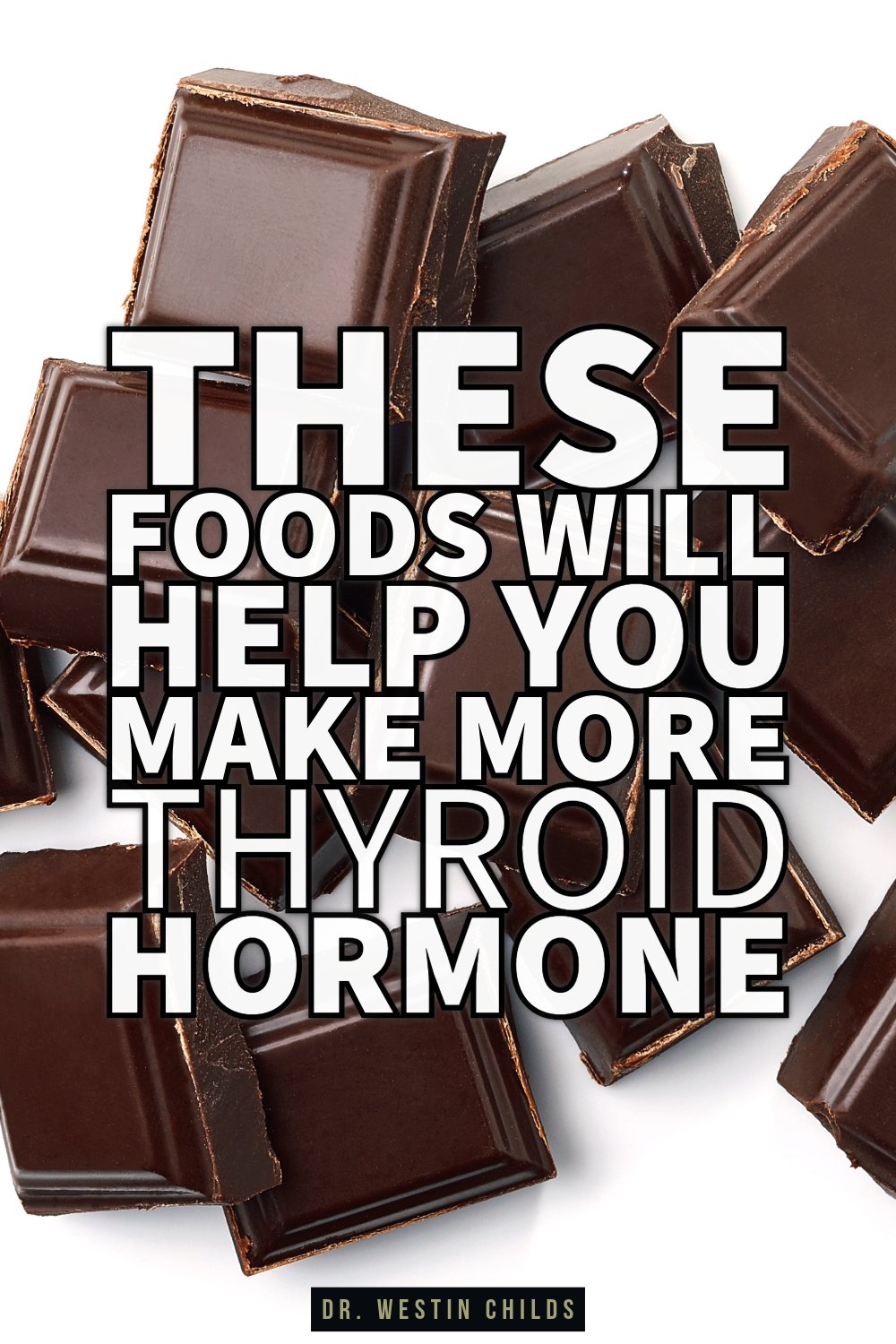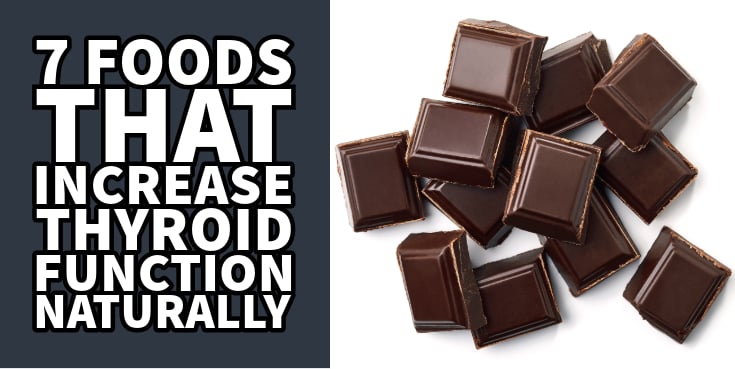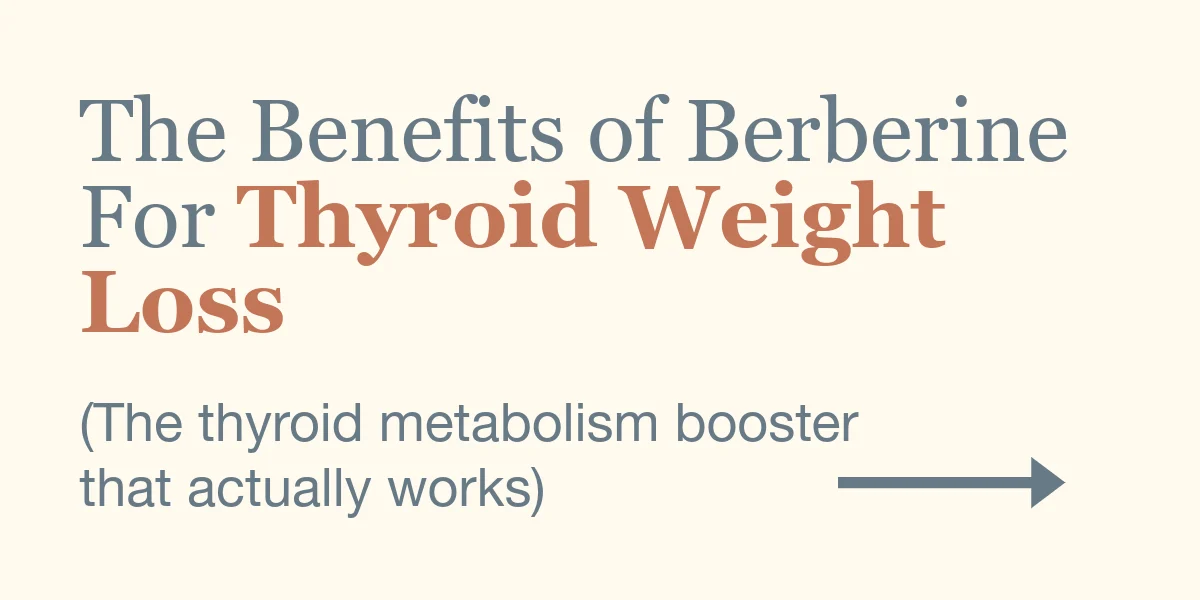Thyroid patients sometimes forget that one of the best tools they have to improve their thyroid is literally at their fingertips.
What is it?
The food that they put into their bodies.
Will it take the place of thyroid medication? Not necessarily.
But can it help your thyroid work more effectively and help you feel better? Absolutely.
But in order to get this benefit, you must eat the right foods.
If you like the idea of being less reliant on thyroid medication and helping your thyroid to work more effectively, then these are the foods you’ll want to eat more of:
DOWNLOAD FREE RESOURCES
Foods to Avoid if you Have Thyroid Problems:
I’ve found that these 10 foods cause the most problems for thyroid patients. Learn which foods you should avoid if you have thyroid disease of any type.
The Complete List of Thyroid Lab tests:
The list includes optimal ranges, normal ranges, and the complete list of tests you need to diagnose and manage thyroid disease correctly!
1. 70% or Greater Dark Chocolate
Dark chocolate is one of my all-time favorite foods, period, but it also has plenty of benefits for your thyroid (1).
Why?
For several reasons:
The first is that it contains plenty of magnesium, which is required for the production of thyroid hormone.
The second is that it’s loaded with antioxidants in the form of epicatechins (2) (a flavonoid) which enhances the production of nitric oxide thereby improving blood flow (and nutrient flow) throughout the body.
The third is that it contains compounds known as theobromine and tryptophan, which have a calming effect on your brain, leading to a more balanced mood.
But, let’s be real, probably the most important benefit is the fact that it tastes amazing.
So really, the most difficult part about eating dark chocolate has more to do with limiting your intake than anything else.
To maximize the benefit to your thyroid, you want to stick to just 1-2 ounces per day of at least 70% dark chocolate or greater.
In addition, you also want to make sure whatever chocolate you’re eating is minimally processed (to preserve the antioxidants found inside), doesn’t contain any artificial sweeteners or flavors, and doesn’t contain any dairy (we aren’t talking milk chocolate here), and has no preservatives or unnecessary ingredients.
Basically, you just want your bar to contain cocoa, a little bit of sugar, coconut butter, or cocoa butter, and maybe some natural flavor like vanilla.
Just remember to keep your intake to a minimum!
Dark chocolate is naturally high in fat, and if you don’t keep track of your intake, you run the risk of extra weight gain, which won’t do you any favors with your thyroid problem.
Here are a few bars that you can look into:
- Hu Kitchen Dark Chocolate
- Green & Black’s Organic 85%
- Theo Pure Dark Chocolate
- Alter Eco Deep Classic Blackout
2. Brazil Nuts (1-2 Per Day)
Brazil nuts are hands down the single best source of selenium in any food out there (3).
They aren’t perfect, by any means, which we will discuss in a minute, but if you want to get more selenium, they are what you need.
Selenium, of course, provides huge benefits to thyroid function by supporting deiodinase enzymes.
These enzymes help your body use thyroid hormones by activating and converting them.
Selenium also protects your thyroid gland against iodine-induced damage and has even been shown to reduce thyroid antibodies in those with Hashimoto’s thyroiditis.
If you want to move the needle most with any food, try 1-2 Brazil Nuts each day.

But here’s a few things to remember:
The selenium content within each nut can vary significantly, depending on the source, with the average being somewhere around 40-50 mcg per nut.
If you consider the ideal selenium intake for thyroid patients to be somewhere around 75-150 mcg, you can get by with just 1-2 nuts per day (to leave some wiggle room for supplements and other food sources of selenium).
Just remember that more is not better when it comes to this food.
Stick to a lower intake because it is possible to eat more than you need, leading to unwanted symptoms of excess selenium intake.
3. Broccoli
Some experts (and thyroid patients) will tell you to avoid cruciferous vegetables like broccoli if you have a thyroid problem.
But I’m here to tell you that avoiding broccoli is probably one of the worst things you can do if you have a thyroid problem.
Why?
Because broccoli contains an incredibly healthy compound known as sulforaphane (4).
This sulfur-containing compound has powerful anti-inflammatory and antioxidant potential making it great for inflammatory-related conditions.
And if you look at the #1 cause of thyroid disease in developed countries, you will see that it stems from inflammation and autoimmunity!
But beyond this, eating broccoli also provides a boost to your body’s ability to detox, which again, is very important for thyroid patients who can’t do this effectively.
As well as a benefit to your weight.
But what about the critics, is there any valid criticism there?
Well, sort of.
Broccoli does contain goitrogens which can act to block the production of thyroid hormone from the thyroid gland.
But proper preparation and adequate iodine intake completely negate these negative side effects.
So you can have peace of mind as you munch down on your broccoli knowing that it’s boosting your thyroid and reducing your risk of cancer and inflammation at the same time.
As far as volume goes, you can pretty much eat as much as you want.
While it’s theoretically possible to eat enough to cause thyroid problems, your stomach will be full long before you get there.
But at least aim for 1-2 servings per day.
4. Shiitake Mushrooms
Shiitake mushrooms are one of the healthiest mushrooms out there due to their effects on the immune system because they are one of the richest sources of a compound known as spermidine.
Spermidine is often talked about as an anti-aging compound (5) but it also supports thyroid health (6).
It does this by supporting the function of the thyroid hormone at the cellular level.
This means that no matter how much thyroid hormone you have floating around in your body (even if it’s not as much as you’d like), spermidine can help it work more effectively.
As an added bonus, spermidine can also help with hair growth by prolonging the anagen phase of the hair cycle, which is great for thyroid-related hair loss.
Eating this mushroom also gives you a nice boost of zinc and B vitamins which are essential for thyroid hormone and cellular energy production.
The best way to prepare and eat Shiitake mushrooms for thyroid patients is by including them in what I call a Veggie hummus.
You can see exactly how I recommend using them here.
5. Pumpkin Seeds
Thinking about a midday snack? Reach for some pumpkin seeds.
These seeds are an excellent source of both magnesium and zinc.
In fact, they are one of the highest plant-based sources of zinc out there and have more zinc than both turkey and pork!
But where they really shine is in their magnesium content (7).
Each serving contains up to 150 mg of magnesium, which is incredible.
This super dose of magnesium will help your thyroid gland get the iodine it needs to create more thyroid hormones, calm down your nerves, and even support cellular thyroid function.
1 serving of pumpkin seeds is around 1 ounce or 28 grams, but if you just want to eyeball it, shoot for about a handful.
1 handful once or twice per day will deliver pretty much all of the magnesium that your thyroid needs (but not quite all of the zinc that it needs).
6. Greek Yogurt
Yes, Greek yogurt is considered a dairy product and yes, going dairy-free may be beneficial for many thyroid patients but it’s included here for a few reasons:
First, because it’s one of the single most calorie-efficient ways to increase your protein intake.
One serving of non-fat Greek yogurt has around 18 grams of protein for around 100 calories.
This calorie-to-protein ratio is nearly as efficient as protein powder except in this case, you’re getting it from whole food!
And increasing your protein intake is incredible for thyroid health because it helps support your lean muscle mass, which is a major target of thyroid hormone action.
In addition to this, Greek yogurt is low in sugar, high in probiotics, high in calcium, and low in lactose.
You can also dress up Greek yogurt with other healthy foods like fruits, nuts, seeds, and other toppings, which provide variety day to day.
If you aren’t already eating Greek yogurt every day as a thyroid patient, give it a try.
1-2 servings per day of non-fat organic Greek yogurt is best.
7. Wild-Caught Salmon
Speaking of protein with an added bonus, let’s talk about salmon.
Salmon is an incredible source of omega-3 fatty acids, as EPA and DHA, which provide anti-inflammatory benefits.
It also happens to be a great whole-food source of protein.
One serving provides your body and thyroid with 40 grams of high-quality protein and 1.2-2.4 grams of EPA and DHA.
This combination provides benefits to your immune system, thyroid gland, mood, and muscle mass all at the same time.
If you have one serving of salmon (40 grams) plus 2 servings of Greek yogurt each day (36 grams) you’ll get 76 grams of protein which almost gets you to your 100-gram day goal as a thyroid patient.
As far as quality goes, look for wild-caught instead of farmed salmon because the former contains fewer contaminants, has a more balanced ratio of omega 3:6 fatty acids (8), and has a better taste/flavor.
One filet 2-3 days per week will allow you to tap into all of the benefits without running the risk of overexposure to contaminants and heavy metals like mercury.
Final Thoughts
Altering your diet to improve your thyroid is one of the most powerful tools at your disposal as a thyroid patient.
Never forget that the food you put into your mouth can have a positive or negative impact on both T4 and T3.
All you need to do is eat more of the right foods and less of the wrong foods.
And by the way, changing your diet isn’t the only thing you can do to naturally improve T4 and T3 levels.
If you want to see what else works, check out this article next.
Scientific References
#1. https://pmc.ncbi.nlm.nih.gov/articles/PMC9589144/
#2. https://pubmed.ncbi.nlm.nih.gov/27329037/
#3. https://pubmed.ncbi.nlm.nih.gov/18258628/
#4. https://pmc.ncbi.nlm.nih.gov/articles/PMC6815645/
#5. https://pmc.ncbi.nlm.nih.gov/articles/PMC6287690/
#6. https://pubmed.ncbi.nlm.nih.gov/30725486/
#7. https://pmc.ncbi.nlm.nih.gov/articles/PMC9182978/
#8. https://pmc.ncbi.nlm.nih.gov/articles/PMC7766777/








